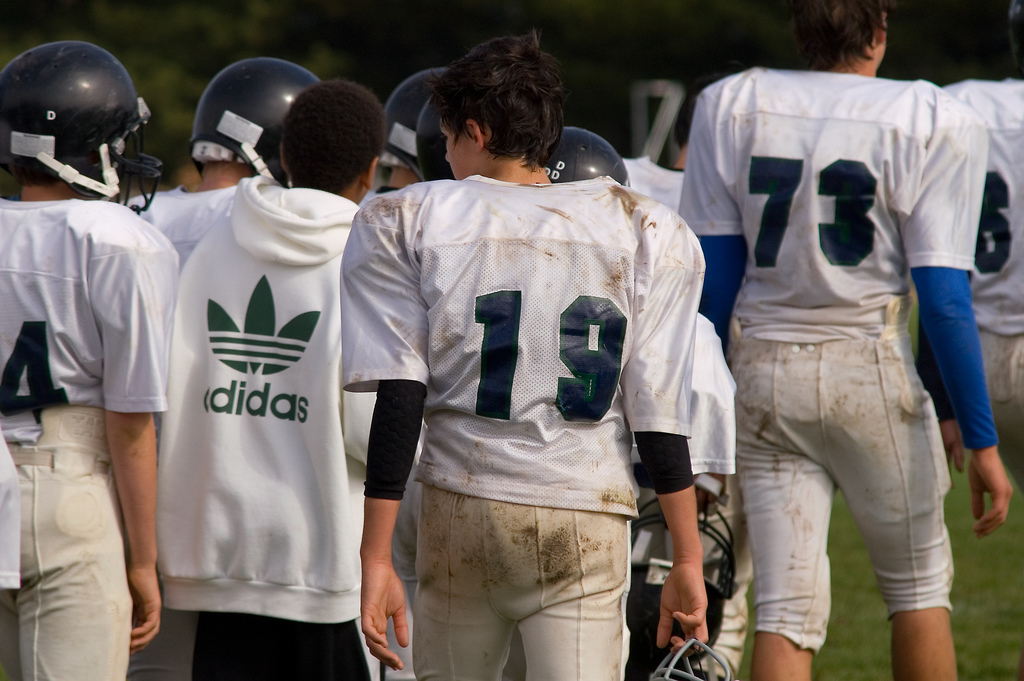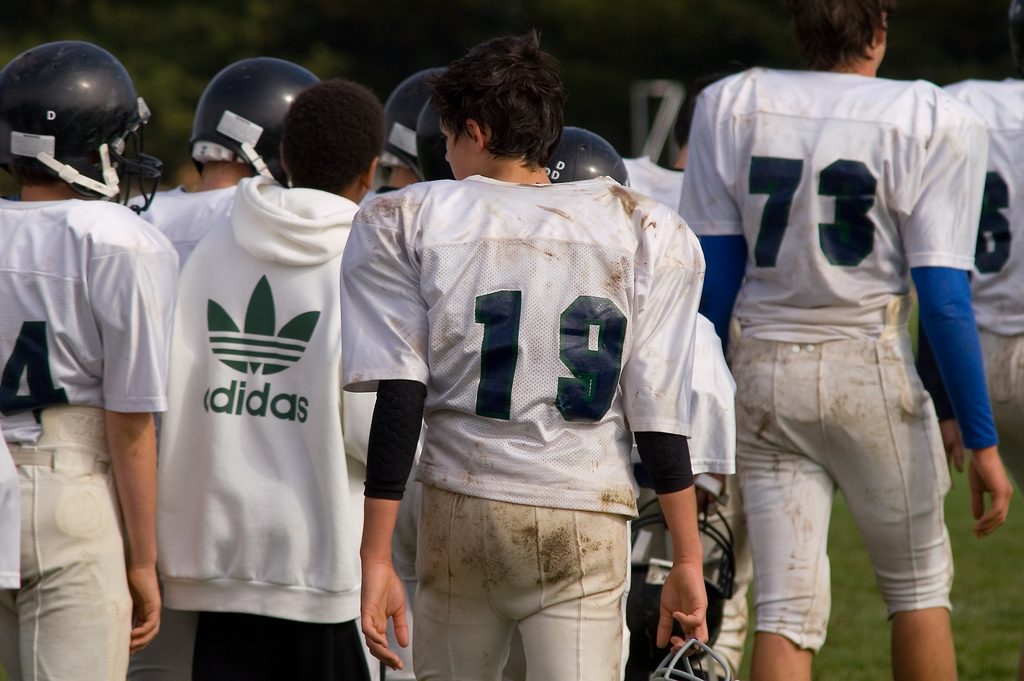Yesterday, the medical journal Neurology published a study suggesting that professional football players are 4 times more likely to die from the Alzheimer’s disease and ALS (Lou Gehrig’s disease) than the general population. This is just the most recent addition to a growing body of evidence linking football to neurodegenerative disease.
As a pediatric health care provider, this body of research continues to be alarming and thought-provoking. As a mother of two boys* (and another on the way), it is terrifying. And complicated.
My husband and I both grew up in small towns where football was a huge part of the community. I was a member of the high school pep band and attended every single home high school football game. I loved those Friday nights when it seemed that everyone in town had come to the football field to cheer on the local team. My husband was a player for his team and has fond memories of the physical challenges of the sport as well as the camaraderie he developed with his teammates. We both continue to enjoy the game, and watch our Mizzou Tigers faithfully during football season. If – when we were expecting our first son in 2006 – you would have asked us if we thought football was too unsafe to allow our son to play, we both would have laughed. But a lot has changed since then, and there is now strong evidence (most released just within the last few years) that the repetitive trauma experienced in football is linked to depression, memory loss, suicide, and neurdegenerative disease. My husband and I have had many thoughtful conversations about this issue, and we are both unsure we can ever let our sons play. We agree that we will encourage other sports and interests and will be perfectly content if our sons never want to play. And we certainly won’t sign them up to participate in local youth football leagues, where – at least in our community – children as young as 8 years old practice up to 6 hours a week in full pads. But we haven’t decided what we will do if one of our boys asks us to play in junior high school. Luckily we have at least 7 years to make that decision.
Many have argued that the study published yesterday applies only to professional football players, elite athletes who take much harder hits for many more years than your average youth football player. That may be true in this case and, of course, research and statistics are tricky things. You can’t make decisions based on one study, and – at the end of the day – statistics are good at telling you what will happen to a group of 100 people, but not necessarily good at telling you what will happen to an individual. But isn’t about just one study or one group or one individual. Boston University’s Center for the Study of Traumatic Encephalopathy has an entire list of published studies on the effects of concussion and repetitive head trauma on young athletes. They are just one of the research teams finding that in football players – particularly those in “speed positions” who experience the hardest hits and are at greatest risk for concussions and repetitive head injuries – brain structure and function are altered. It is hard to ignore heart-wrenching stories (like this one) of boys who have died because their brains were damaged from the repetitive head trauma experienced in football. And consensus is growing among the medical community that football is bad for kids – it seems that every time I turn around, a pediatrician or orthopedic physician has written a blog post outlining why she won’t let her own children play football (see this one by Wendy Sue Swanson, MD).
Many supporters of youth football concede that the risks of neurological damage are increased, but argue that they are still small. They say that kids can get hurt doing a lot of things, that their child enjoys the sport. They cite the benefits of football – the exercise and physical activity, learning to be a part of a team, to be disciplined, to push themselves – and they choose to let their son play. I don’t think those parents are necessarily wrong. Parenting (and life, really), is about weighing benefits and risks and making informed – and often difficult – decisions. But I would argue that kids can get all those things – exercise, team building, discipline – from other activities that don’t carry the risk of head injury (I would also argue that – given the Greg Williams “Bountygate” and recent events at Penn State – the culture of football seems to be a lot more about winning games than caring about the mental and physical health of children and players, but that’s a post for another day).
I don’t judge the parent whose child plays youth football, but I do think he would be remiss if he didn’t educate himself and thoughtfully consider the risks and benefits associated with the sport. Taking an “I played and I turned out just fine” attitude doesn’t cut it – we have to set aside the fond memories and emotions we associate with the game and take a real look at the science and evidence before us. We have a lot more information than we did 10 years ago, and we are fortunate we can use that information to make better decisions for our children. And in our family, I think the decision is no football…for now.
*I in no way intend to be sexist or offensive by only referencing boys in this post. I know that girls do play football and I encourage parents of female football players to also seriously consider the evidence before letting their child play. But because that is a very rare occurrence – and because all research referenced in this post was done on boys – I chose to male pronouns throughout this post.


Good read.As a physical therapist myself with a son, my husband and I also chose not to have our son play.We did try it for one year when he was in kindergarten.We assumed it would be fun to try out flag football.No tackling involved so less risk of injury.Yes, there were no injuries but the competitive nature of it was ridiculous ( and we are highly competitive people).After one year we informed our son he could not play for now.The main reason was the amount of practice time required that pulls him from being a child.He would be required to attend football practice three times per week in August which interferes with us camping as a family.We believe the free play that our children engage in while we are camping ie swimming, boating, hiking, fishing, frogging, bike riding is a huge part of our children’s development.In addition as they got older to tackle football with pads (grades 3-5) they practice every night of the week until 8:30pm sometimes.Anyway, I digress.We said no due to the time commitment required but the decreased risk of injury was also on our minds.
I think that the risk of long term injury is not limited to football.Soccer has a higher injury rate than football – http://yourtherapysource.blogspot.com/2010/02/youth-soccer-higher-injury-rates.html.Young children are playing too many organized sports.Traditionally, children play baseball or softball in the Spring.Now they are adding “Fall Ball”.So children are signed up to play soccer and “fall ball”.Basketball used to only be played in the Winter.Now travel teams extend the season through the Spring and beyond.All of this repetitive motor skill practice wears and tears on the young joints and muscles.Not to mention the exhaustion that sets in – school all day, after school practices or special lessons (pitching, shooting, batting, etc) followed by a game (or 2 for some children).This exhaustion sets the child up for injury.
What is the purpose of this?I wonder if many parents believe that their child is heading for professional sports.The odds of becoming a professional athlete are slim to none: .04% for basketball, the highest is .4% for baseball*, and only 1% of high school athletes get a division 1 scholarship **.Organized sports for young children are taking too much time away from traditional childhood exploration.I use the word childhood to indicated children prior to high school.I do understand that once children are in high school sports take up a larger chunk of time.
What parents decide for their own children is their own choice.I am sure parents pass judgement on our decisions to decline sports off season due to other obligations that take priority (ie church functions, camping, down time, etc).I am not passing judgement on their decisions but it is my opinion (with some facts to back it up) that over-training at a young age can result in burn out or injury.
I could go on and on about this and why our culture is changing so much but it goes way beyond the risk of football.
*from http://www.thesportdigest.com/archive/article/what-are-odds-becoming-professional-athlete
**from http://enidnews.com/sportshighschool/x518638950/Chances-of-playing-NCAA-Division-1-sports-small-for-prep-athletes